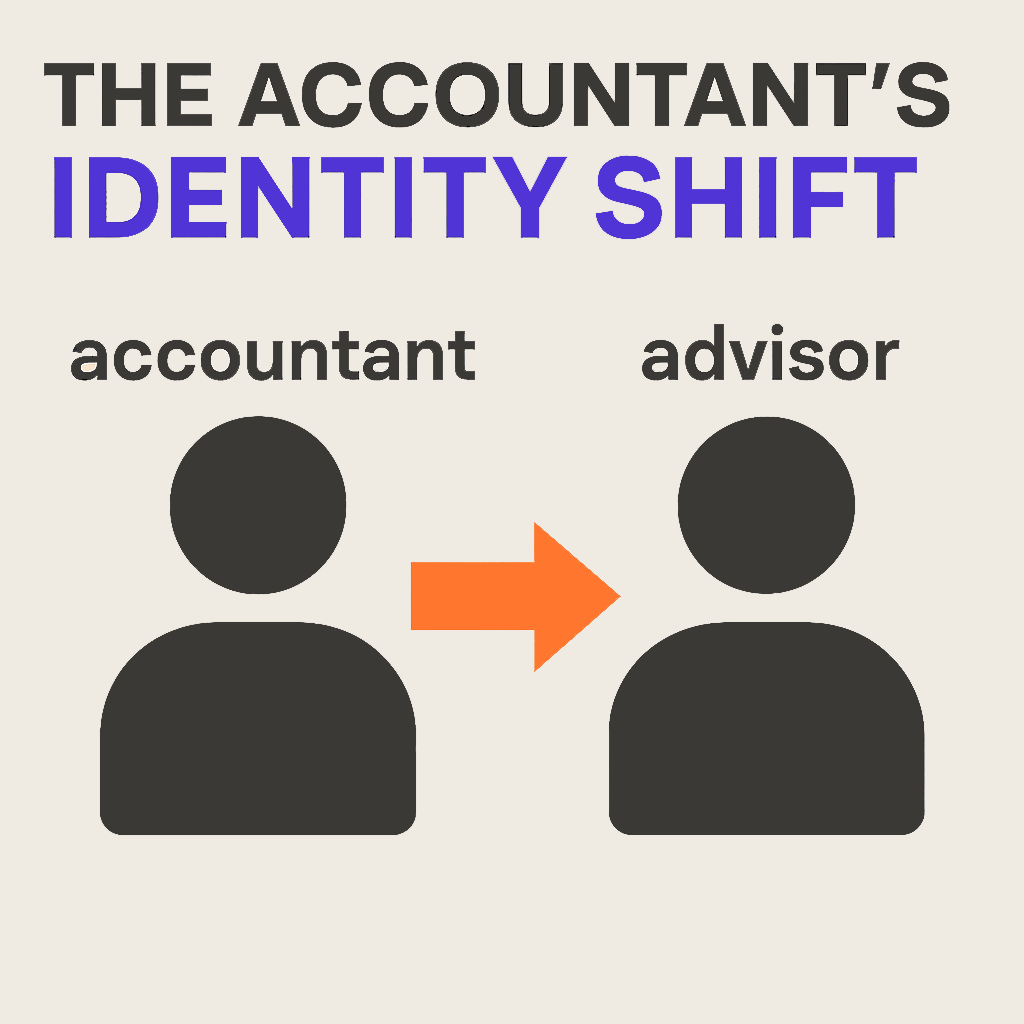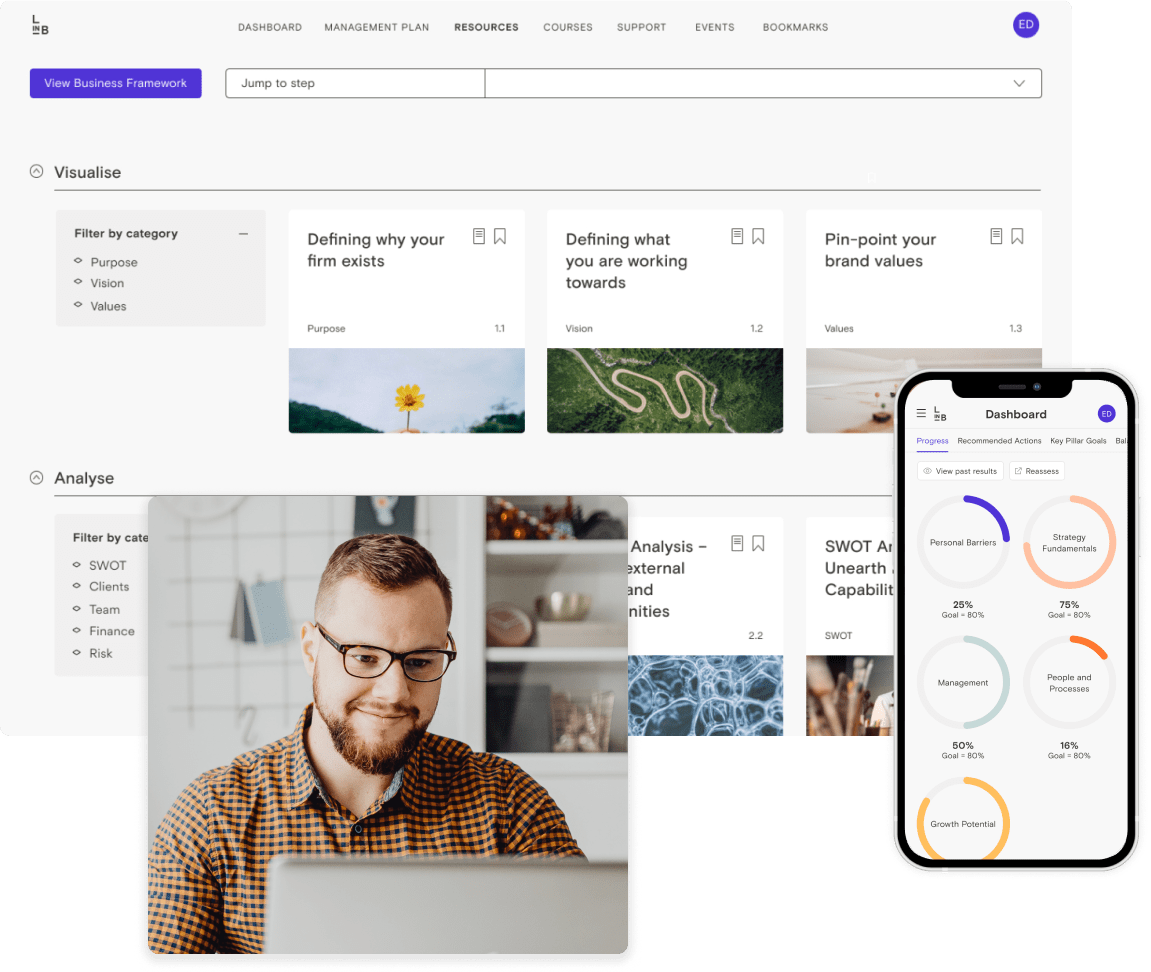

“Have the courage to follow your heart and intuition. They somehow already know what you truly want to become.” – Steve Jobs
Most accountants begin their career focused on precision, reconciling, reporting, and making sense of the past. You’re trained to review what’s already happened, last quarter’s P&L, last year’s tax return, last month’s ledger.
For the longest time, that rear-facing lens has been both expected and valuable. You get good at being accurate and pride yourself on being reliable. You make sense of the past so clients can stay compliant in the present.
But here’s the thing: your business owning clients don’t live in the past, and much of their present is now spent focusing on what’s next.
Clients don’t just need someone to report on what’s happened, they need someone who can help shape what happens next by establishing a clear, strategic business direction. They need a mentor and a guide, whose expertise can turn financial hindsight into strategic foresight.
Recognising the needs of clients and responding to them are two different things. Advisory focuses as much on response as it does recognition, and for many accountants that concept feels both familiar and foreign. Familiar, because you’ve likely brushed up against it at conferences, in passing conversations, or seen other firms give it a go. Foreign, because it still feels disconnected from the role you’ve trained for your entire career.
After all, the strategic business advice you provide doesn’t come with clean endpoints. It’s not a checklist. It’s not something most of us were taught to deliver and it’s definitely something you grow into. Which is why, even if it makes sense on paper, it can feel misaligned in practice. The discomfort you may feel doesn’t mean you’re unqualified. That alignment has nothing to do with your skill, and everything to do with your story.
Even when the idea of advisory feels right, adopting the identity of an advisor often doesn’t. Not at first.
That’s because it challenges the deeply ingrained narrative that many of us carry about what it means to be “good at your job”. Our training, experience and mindsets are highly specialised, and accountants are known for working with concrete fact.
This might lead you to think:
These apprehensions are normal. They come from a professional identity that’s rooted in certainty, structure, and being the one with the exact answer; not the one asking the big, open-ended questions.
But shifting into advisory doesn’t mean abandoning that identity. It means broadening it.
The mindset shift isn’t from “accountant” to “something else.” It’s from accountant as a technical expert to accountant as a strategic partner with technical expertise.
You’re not giving up precision. You’re applying it differently. You’re not leaving behind structure. You’re bringing it to conversations. You’re not stepping away from numbers. You’re stepping closer to their meaning.
Advisory doesn’t require you to become a coach, a marketer, or a business guru. It simply asks you to see your existing value in a new light and use it to help clients look forward, not just back, by fully stepping into the role your clients already believe you can play.
You don’t have to transform overnight. In fact, you’re likely already doing some advisory work, you just haven’t named it, structured it, or charged for it yet.
Remember that advisory is, at its very core, the act of creating meaning by structuring advice around a client’s goals and future aspirations.
With that in mind, this is what the shift looks like:
| The Historian | The Strategic Advisor |
| “Here’s what happened.” | “Here’s what we can do next.” |
| Provides reporting | Facilitates decision-making |
| Waits for questions | Leads with insight |
| Reacts to numbers | Interprets patterns |
| Tracks compliance | Guides strategy |
Instead of saying, “Your margin is down this quarter,” the advisor asks, “Is your pricing model built to last, or is it time to rethink?”.
Instead of stopping at, “You made a solid profit,” the advisor asks, “Where can we use that profit to support your longer-term goals?”
Remember it’s a shift in lens, not a change in personality. The same knowledge, used with different intent.
The Pressure to Have the Perfect Answer:
In compliance, you’re expected to be correct. In advisory, you’re expected to explore.
That can feel uncomfortable. But advisory isn’t about being right, it’s about being useful. Your job isn’t to predict the future, it’s to help your client make smarter decisions about it.
Instead of certainty, aim for clarity. Instead of control, aim for direction.
The Fear of Overstepping:
Some accountants worry advisory means “playing consultant” and telling clients what to do. But these clients already trust your judgment, they just don’t always know how to ask for your input.
By reframing your advice as facilitation alongside direction, you stay grounded in your strengths. Think of yourself as the one asking better questions and proposing a better plan for what to do next.
The Belief That You’re Not “That Kind” of Accountant:
You don’t need to change who you are. You just need to see how what you already do has value beyond reporting. Every time you link financials to a client’s goals and every time you help them understand the impact of a decision, you’re already advising.
Start by identifying where you’re already showing up as an advisor.
Use these moments as your launchpad. They are proof you’re already operating beyond the numbers; you just haven’t named it yet. From there it’s a process of formalising your value. A session format with a documented approach gives structure to what may now feel spontaneous. It also signals to clients that this isn’t just “extra help”, it’s a deliberate, high-value component of your service and support for their business. Start small, stay consistent, and build confidence as you go. Advisory grows with every conversation you choose to guide, not just deliver.
When you begin to see yourself as more than a compliance expert, everything starts to fall into place.
You connect more deeply with clients and create more meaningful work for your team. You unlock new revenue streams, not by working more, but by working smarter.
But most importantly, you build a firm that reflects your full value, and your clients finally get to experience it.
